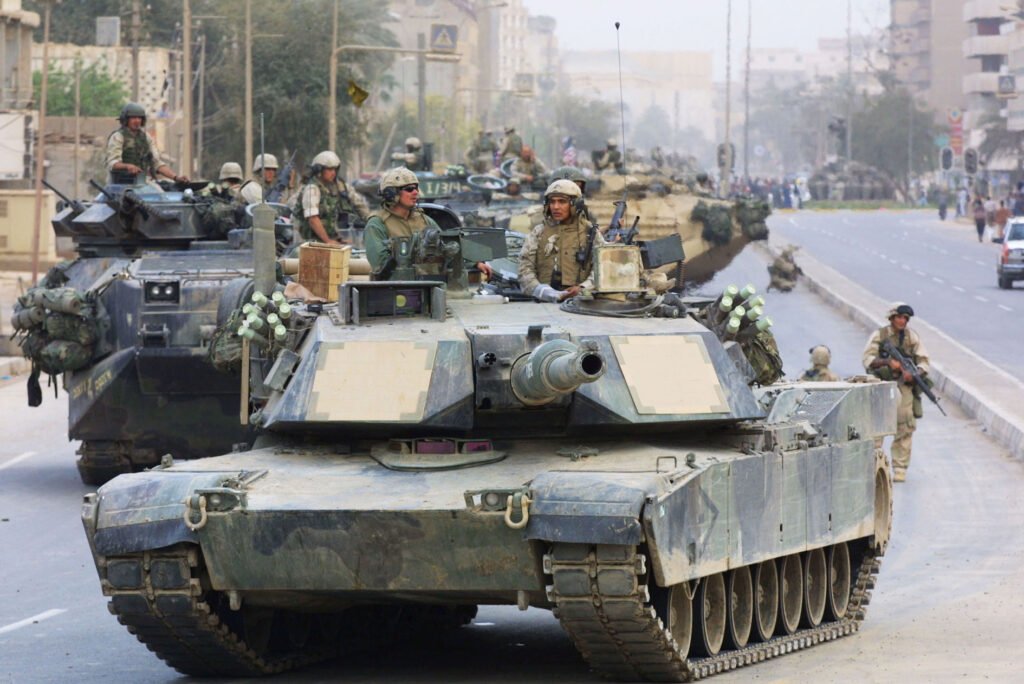In March 2003, the Royal Scots Dragoon Guards (RSDG) made history as their tanks crossed the Iraq-Kuwait border, leading them into the pivotal Battle for Basra during the Iraq War. This engagement, especially the ‘14-0’ battle between British forces and the Iraqi Army’s 51st Division, remains one of the most significant tank battles since World War II.
The Royal Scots Dragoon Guards, a prestigious regiment known for its iconic history dating back over 300 years, was tasked with providing reconnaissance and support during the conflict. On March 21, 2003, the British 7 Armoured Brigade, including the RSDG’s Challenger 2 tanks, clashed with Iraqi armor as it moved out of Basra towards the vital Al Faw peninsula, home to crucial oil installations. The battle involved 14 Challenger 2 tanks, with British forces destroying as many as 14 enemy tanks and several other vehicles without losing a single tank, making this one of the most remarkable armored engagements in modern warfare.

Captain Harry Jameson, leader of ‘C’ Squadron’s 4 Troop, recalled the initial steps of the operation: “We received reports that Marines were under fire from Iraqi T-55 tanks. It was a vast, marshy area filled with oil fields, so we moved in to provide armored support.” Jameson’s squadron made a daring night march, crossing the Shatt Al Arab river to join the fray. Despite minimal rest, the RSDG pushed forward, navigating through the marshlands and engaging enemy armor with precision.
The Royal Scots Dragoon Guards were up against formidable opposition. The Iraqi forces used static armored vehicles, similar to pillboxes, alongside mobile tanks. Despite the difficult terrain and limited resources, the British forces advanced, destroying both static and mobile enemy armor. The lack of detailed maps added to the challenge, as Lieutenant-Colonel Hugh Blackman, the RSDG commander, explained, “We had little mapping for Al Faw. Most commanders had to hand-draw rough approximations of the region.”
The battle took place on treacherous ground. The route the tanks followed led them through salt flats and drained marshland, making navigation difficult. The tanks, however, were unstoppable. By the end of the operation, the RSDG had destroyed a significant portion of the Iraqi armor and secured the region, much to the satisfaction of the Marines, who had never worked alongside tanks before.
The successful operation marked a crucial moment for the Royal Scots Dragoon Guards, showcasing the effectiveness of their Challenger 2 tanks in combat. However, the operation was not without challenges. The RSDG’s integration with the Royal Marines highlighted a lack of experience in infantry-tank cooperation. Furthermore, logistical resupply for the heavy tanks proved far more demanding than anticipated.
Following the success in the Al Faw peninsula, ‘C’ Squadron returned to Shaibah, where they acted as a reserve force. The Battle of Basra remains a defining chapter in both the history of the Royal Scots Dragoon Guards and the broader Iraq War, highlighting the regiment’s adaptability and the crucial role of armored units in modern warfare.
The victory also marked the first significant deployment of Britain’s M3 amphibious rigs, which proved essential in crossing hazardous tidal mudflats to establish bridges. Despite the risks, these vehicles enabled crucial mobility, although the operation came with its share of close calls and tense moments.
This battle is remembered not only for its strategic importance but also for the unwavering courage and skill displayed by the Royal Scots Dragoon Guards in the face of adversity. Their role in the Battle for Basra remains one of the most remarkable moments in British military history.


